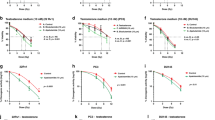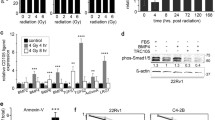Abstract
Background
Currently, docetaxel is used to treat hormone-refractory metastatic prostate cancer. Docetaxel not only inhibits microtubule formation but can also downregulate expression of Bcl-2, a known antiapoptotic oncogene. Furthermore, the 26S proteasome inhibitor bortezomib can downregulate Bcl-2 expression. Previously, we demonstrated that overexpression of Bcl-2 renders cells resistant to radiation therapy. In this study, we investigated whether treating human prostate cancer cells with docetaxel, bortezomib, or both could modulate Bcl-2 expression and whether such modulation could render Bcl-2-overexpressing cells more susceptible to radiation.
Methods
PC-3-Bcl-2 and PC-3-Neo human prostate cancer cells treated with docetaxel and/or bortezomib in addition to irradiation were analyzed in vitro for proliferation, clonogenic survival, cell cycle phase distribution, and expression of Bcl-2 and Bcl-xL proteins.
Results
Docetaxel and bortezomib alone had significant cytotoxic effects. In addition, docetaxel, bortezomib, or radiation resulted in a G2M phase arrest in PC-3-Bcl-2, whereas only docetaxel or radiation did so in PC-3-Neo cells. Both cell lines were more sensitized to radiation’s killing effects when treated with the combination of docetaxel and bortezomib than when treated with either agent alone. Furthermore, docetaxel and bortezomib-treated cells exhibited marked changes in the expression of Bcl-2 and Bcl-xL.
Conclusions
This is the first study to demonstrate that docetaxel and bortezomib in combination can effectively sensitize Bcl-2-overexpressing human prostate cancer cells to radiation effects by modulating the expression of key members of the Bcl-2 family. Together, these findings warrant further evaluation of the combination of docetaxel and bortezomib in prostate cancer.



Similar content being viewed by others
References
Jemal A, Siegel R, Ward E et al (2007) Cancer statistics. CA Cancer J Clin 57:43–66
Merrill RM, Brawley OW (1997) Prostate cancer incidence and mortality rates among white and black men. Epidemiology 8:126–131
Shipley WU, Verhey LJ, Munzenrider JE et al (1995) Advanced prostate cancer: the results of a randomized comparative trial of high dose irradiation boosting with conformal protons compared with conventional dose irradiation using photons alone. Int J Radat Oncol Biol Phys 32:3–12
Pollack A, Zagars GK, Starkschall G et al (1996) Conventional vs. conformal radiotherapy for prostate cancer. Preliminary results of dosimetry and acute toxicity. Int J Radiat Oncol Biol Phys 34:555–564
Bagshaw MA, Kaplan ID, Cox RC (1993) Prostate cancer. Radiation therapy for localized disease. Cancer 71:939–952
Pollack A, Zagars GK, Smith LG et al (2000) Preliminary results of a randomized radiotherapy dose-escalation study comparing 70 Gy with 78 Gy for prostate cancer. J Clin Oncol 18:3904–3911
Pilepich MV, Perez CA, Walz BJ et al (1981) Complications of definitive radiotherapy for carcinoma of the prostate. Int. J Radiat Oncol Biol Phys 7:1341–1348
Shipley WU, Zietman AL, Hanks GE et al (1994) Treatment-related sequelae following external beam radiation for prostate cancer: a review with an update in patients with stage T1 and T2 tumors. J Urol 152:1799–1805
An J, Chervin AS, Nie A et al (2007) Overcoming the radioresistance of prostate cancer cells with a novel Bcl-2 inhibitor. Oncogene 26:652–661
Mackey TJ, Borkowski A, Amin P et al (1998) bcl-2/bax ratio as a predictive marker for therapeutic response to radiotherapy in patients with prostate cancer. Urology 52:1085–1090
Rakozy C, Grignon DJ, Sarkar FH et al (1998) Expression of bcl-2, p53, and p21 in benign and malignant prostatic tissue before and after radiation therapy. Mod Pathol 11:892–899
Grossfeld GD, Olumi AF, Connolly JA et al (1998) Locally recurrent prostate tumors following either radiation therapy or radical prostatectomy have changes in Ki-67 labeling index, p53 and bcl-2 immunoreactivity. J Urol 159:1437–1443
Huang A, Gandour-Edwards R, Rosenthal SA et al (1998) p53 and bcl-2 immunohistochemical alterations in prostate cancer treated with radiation therapy. Urology 51:346–351
Tannock IF, de Wit R, Berry WR et al (2004) Docetaxel plus prednisone or mitoxantrone plus prednisone for advanced prostate cancer. N Engl J Med 351:1502–1512
Petrylak DP, Tangen CM, Hussain MH et al (2007) Docetaxel and estramustine compared with mitoxantrone and prednisone for advanced refractory prostate cancer. N Engl J Med 351:1513–1520
Kraus LA, Samuel SK, Schmid SM et al (2003) The mechanism of action of docetaxel (Taxotere) in xenograft models is not limited to bcl-2 phosphorylation. Invest New Drugs 21:259–268
Fennell DA, Chacko A, Mutti L (2008) BCL-2 family regulation by the 20S proteasome inhibitor bortezomib. Oncogene 27(9):1189–1197
Rosser CJ, Tanaka M, Pisters LL et al (2004) Adenoviral-mediated PTEN transgene expression sensitizes Bcl-2-expressing prostate cancer cells to radiation. Cancer Gene Ther 11:273–279
Tanaka M, Rosser CJ, Grossman HB (2005) PTEN gene therapy induces growth inhibition and increases efficacy of chemotherapy in prostate cancer. Cancer Detect Prev 29:170–174
Anai S, Goodison S, Shiverick K et al (2007) Knock-down of Bcl-2 by antisense oligodeoxynucleotides induces radiosensitization and inhibition of angiogenesis in human PC-3 prostate tumor xenografts. Mol Cancer Ther 6:101–111
Rosser CJ, Reyes AO, Vakar-Lopez F et al (2003) Bcl-2 is significantly overexpressed in localized radio-recurrent prostate carcinoma, compared with localized radio-naive prostate carcinoma. Int J Radiat Oncol Biol Phys 56:1–6
Fernandez A, Udagawa T, Schwesinger C, Beecken W, Achilles-Gerte E, McDonnell T et al (2001) Angiogenic potential of prostate carcinoma cells overexpressing bcl-2. J Natl Cancer Inst 93:208–213
Pollack A, Cowen D, Troncoso P et al (2003) Molecular markers of outcome after radiotherapy in patients with prostate carcinoma: Ki-67, bcl-2, bax, and bcl-x. Cancer 97:1630–1638
D’Amico AV, Whittington R et al (1998) Biochemical outcome after radical prostatectomy, external beam radiation therapy, or interstitial radiation therapy for clinically localized prostate cancer. JAMA 280:969–974
Pollack A, Zagars GK, Starkschall G et al (2002) Prostate cancer radiation dose response: results of the M. D. Anderson phase III randomized trial. Int J Radiat Oncol Biol Phys 53:1097–1105
Zelefsky MJ, Fuks Z, Wolfe T et al (1998) Locally advanced prostatic cancer: long-term toxicity outcome after three-dimensional conformal radiation therapy—a dose-escalation study. Radiology 209:169–174
Yvon AC, Wadsworth P, Jordan MA (1999) Taxol suppresses dynamics of individual microtubules in living human tumor cells. Am Soc Cell Biol 10:947–959
Lyseng-Williamson KA, Fenton C (2005) Docetaxel: a review of its use in metastatic breast cancer. Drugs 65:2513–2531
Jones SE, Savin MA, Holmes FA et al (2006) Phase III trial comparing doxorubicin plus cyclophosphamide with docetaxel plus cyclophosphamide as adjuvant therapy for operable breast cancer. J Clin Oncol 24:5381–5387
Russo SM, Tepper JE, Baldwin AS Jr, Liu R, Adams J, Elliott P, Cusack JC Jr (2001) Enhancement of radiosensitivity by proteasome inhibition: implications for a role of NF-kappaB. Int J Radiat Oncol Biol Phys 50:183–193
Zamzami N, Brenner C, Marzo I et al (1998) Subcellular and submitochondrial mode of action of Bcl-2-like oncoproteins. Oncogene 16:2265–2282
Bolla M, Collette L, Blank L, Warde P et al (2002) Long-term results with immediate androgen suppression and external irradiation in patients with locally advanced prostate cancer (an EORTC study): a phase III randomised trial. Lancet 360:103–106
Conflict of interest statement
There is no conflict of interest.
Author information
Authors and Affiliations
Corresponding author
Rights and permissions
About this article
Cite this article
Cao, W., Shiverick, K.T., Namiki, K. et al. Docetaxel and bortezomib downregulate Bcl-2 and sensitize PC-3-Bcl-2 expressing prostate cancer cells to irradiation. World J Urol 26, 509–516 (2008). https://doi.org/10.1007/s00345-008-0289-5
Received:
Accepted:
Published:
Issue Date:
DOI: https://doi.org/10.1007/s00345-008-0289-5




